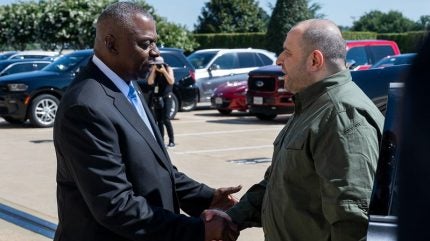
Foreign policy experts have sounded the alarm at Nato extending a ‘bridge’ to advance Ukraine’s membership, warning it would endanger the military alliance – and provoke Russia to prolong its conflict in Ukraine.
In a letter penned by more than 60 geopolitical analysts and academics, the group argues that “the closer Nato comes to promising that Ukraine will join the alliance once the war ends, the greater the incentive for Russia to keep fighting the war and killing Ukrainians so as to forestall Ukraine’s integration into Nato”.
It comes ahead of Nato’s upcoming summit in Washington (9 to 11 July), where US Defence Secretary Lloyd Austin has promised to “build a bridge to Nato membership for Ukraine”.
First released by Politico, the letter criticises such statements as “dangling Nato membership for Ukraine” and “a disservice to Ukrainians who are bravely fighting for their independence”.
Russian military casualties have reached half a million since the full-scale invasion of February 2022, according to the most recent estimates.
Arms abound – but Nato promises are “wishful thinking”
The letter describes talk of a fast-tracked Ukraine Nato accession as “unwise” and “wishful thinking”, a stance supported by Wilson Jones, defence analyst at GlobalData.

US Tariffs are shifting - will you react or anticipate?
Don’t let policy changes catch you off guard. Stay proactive with real-time data and expert analysis.
By GlobalData“It’s all dependent on the status of the lines of contact in Ukraine, but NATO will not admit a member that has an active violent conflict like this,” Jones tells Army Technology. “Sure, it’s likelier five to ten years down the line, when the war ends, but that’s all hypothetical.”
Nato support for Ukraine’s war effort is expected to continue in the form of weapons aid, rather than acceptance into the world’s largest security bloc.
In a recent meeting with his Ukrainian counterpart Rustem Umerov, Austin promised a $2.3bn security package for Ukraine. This is expected to include anti-tank weapons, air defence interceptor – and accelerated procurement of NASAMS and Patriot air defence systems.
The first delivery of F-16s from the Netherlands, meanwhile, is expected imminently, despite concerns of Russia targeting airbases which will house the fighter jets.
Umerov said today (5 July) that a third Patriot system had arrived from Germany, Ukraine’s biggest military backer after the US.
Attention now shifts to the Washington summit, which will see a first appearance for John Healey, the UK’s new Defence Secretary following the Labour Party’s landslide election win today (5 July).
The mood at the summit will perhaps be clouded by President Biden’s faltering debate performances and dwindling confidence among major Democrat donors, which are boosting the prospects of former US President Donald Trump returning to the Oval Office come November.
Trump has been vocally anti-Nato, threatening to let Russia “do whatever the hell they want” with member states which do not meet the alliance’s stipulated 2% spending targets.
Should Trump be reinstated in the White House, most signs point to Ukraine having to cede territory in peace negotiations later this year.
With the letter’s warning that a Ukraine ‘bridge’ could cause the “unravelling of Nato itself” ringing out, this cocktail of diplomatic turmoil should make for a fiery summit in Washington DC.



